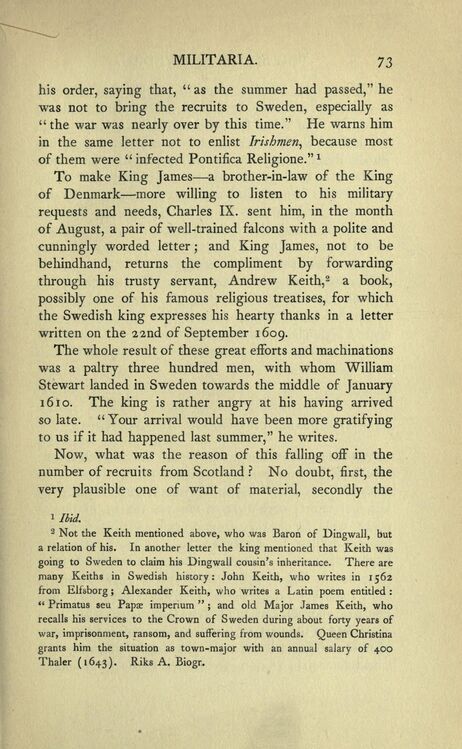
Full resolution (JPEG) - On this page / på denna sida - Sidor ...

<< prev. page << föreg. sida << >> nästa sida >> next page >>
Below is the raw OCR text
from the above scanned image.
Do you see an error? Proofread the page now!
Här nedan syns maskintolkade texten från faksimilbilden ovan.
Ser du något fel? Korrekturläs sidan nu!
This page has never been proofread. / Denna sida har aldrig korrekturlästs.
his order, saying that, “ as the summer had passed,” he
was not to bring the recruits to Sweden, especially as
u the war was nearly over by this time.” He warns him
in the same letter not to enlist Irishmen, because most
of them were “ infected Pontifica Religione.”1
To make King James—a brother-in-law of the King
of Denmark—more willing to listen to his military
requests and needs, Charles IX. sent him, in the month
of August, a pair of well-trained falcons with a polite and
cunningly worded letter; and King James, not to be
behindhand, returns the compliment by forwarding
through his trusty servant, Andrew Keith,1 2 a book,
possibly one of his famous religious treatises, for which
the Swedish king expresses his hearty thanks in a letter
written on the 22nd of September 1609.
The whole result of these great efforts and machinations
was a paltry three hundred men, with whom William
Stewart landed in Sweden towards the middle of January
1610. The king is rather angry at his having arrived
so late. “ Your arrival would have been more gratifying
to us if it had happened last summer,” he writes.
Now, what was the reason of this falling off in the
number of recruits from Scotland ? No doubt, first, the
very plausible one of want of material, secondly the
1 Ibid.
2 Not the Keith mentioned above, who was Baron of Dingwall, but
a relation of his. In another letter the king mentioned that Keith was
going to Sweden to claim his Dingwall cousin’s inheritance. There are
many Keiths in Swedish history: John Keith, who writes in 1562
from Elfsborg; Alexander Keith, who writes a Latin poem entitled :
“ Primatus seu Papæ imperium ” ; and old Major James Keith, who
recalls his services to the Crown of Sweden during about forty years of
war, imprisonment, ransom, and suffering from wounds. Queen Christina
grants him the situation as town-major with an annual salary of 400
Thaler (1643). Riks A. Biogr.
<< prev. page << föreg. sida << >> nästa sida >> next page >>